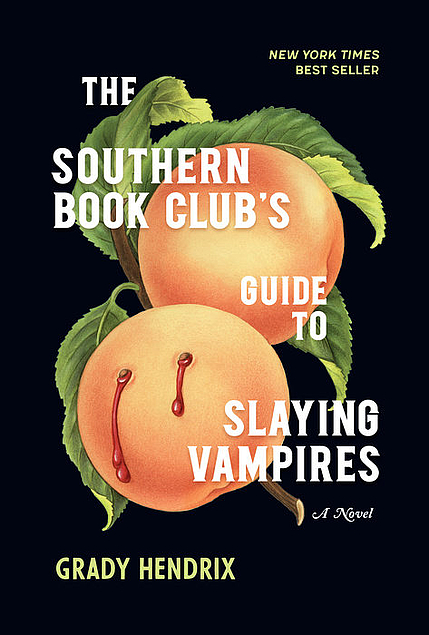New to the Old Village part of Charleston in the 1990s, Patricia Campbell is floundering, so overwhelmed with life that she hasn't even managed to read the book club book she's supposed to lead the discussion for. She wouldn't last long in this book club but she doesn't have to as a splinter "not-a-book-club" group breaks off, choosing to read true crime rather than classics, and composed of several women who become friends, quietly stepping up for each other when required. Several years into the not-a-book-club, Patricia is brutally attacked by an elderly neighbor in a terrifically gory scene but her Southern training is so deeply engrained that she still takes a casserole over to the woman's great-nephew to express her condolences at the woman's death and welcomes him into the neighborhood and the not-a-book-club when he decides to stay.
Shortly after handsome great-nephew James Harris' arrival in town, poor, black children start to go missing or die in unlikely ways but the police seem to care not at all, nor do the denizens of the white part of town even hear about the deaths and disappearances. Patricia tries to rally the other mothers in the not-a-book-club with the knowledge of what she accidentally knows, hears, and sees but they only back her until their appallingly chauvinistic husbands step in to set the poor overwrought, little ladies straight. They like James Harris, they like his money, and they like the life he encourages them to lead, not least of which is the pursuit of money to the exclusion of truth. And so they, and their compliant wives gaslight Patricia. Only Mrs. Greene, the African-American woman who cared for Patricia's mother-in-law, believes Patricia and calls out the privilege and racism that allows Old Village to ignore the fear and evil that stalks her community. Despite the relatively little page time, she, more than main character Patricia, is the moral center of the strangely uneven novel.
The portrayal of all of the characters, with the possible exception of the monster, seem just a bit off. The women are spineless until the very end, caricatures of 50s housewives rather than 90s housewives. The men are disgustingly paternalistic to such a degree that they come off as thoroughly despicable people. All of the marriages are horrid and the character's lives are about an inch deep and completely stereotypical. In fact, Hendrix doesn't seem to like his characters much, especially the female characters, mocking them and offering up their uneventful, bored housewife lives as if they were of little to no value. And this attitude is reflected by his one note good ole boy male characters. In the beginning, despite the over the top gory scenes and one truly terrifying scene of an intruder trying to get into the house (this is the one that features in my nightmares, so thanks for that), there is some humor but this quickly peters out as the book moves into the second half. The narrative tension ratchets up until the rug is pulled out from under the reader and the novel settles down into mediocre dullness for a long stretch followed by a whirlwind, highly graphic ending. There are so many issues touched on in the plot, suicide, racism, sexism, classism, alcoholism, spousal abuse, infidelity, elder caretaking, rape, etc. that few of them receive their due. And while a novel with a book club (or not-a-book-club) at its core is quite likely to be about the sisterhood of women, this doesn't quite get there. Nor does it quite succeed as a paean to mother's love for their children either. Yes, this is a satire and therefore over the top, but the overwrought dialogue, the one-dimensional characters, and the unevenness of the plotting and tension miss the mark. Then again, it did successfully give me nightmares so there's something that transcends these flaws too. Mine is a very unpopular opinion as so many others have loved this so if you like horror or aren't nearly as cowardly as I am, I suggest you make up your own mind on this one.







No comments:
Post a Comment
I have had to disable the anonymous comment option to cut down on the spam and I apologize to those of you for whom this makes commenting a chore. I hope you'll still opt to leave me your thoughts. I love to hear what you think, especially so I know I'm not just whistling into the wind here at my computer.